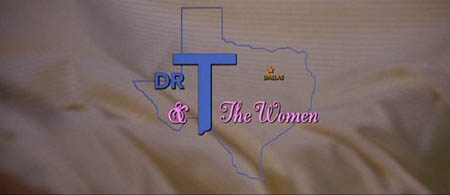
 BUY IT AT AMAZON: CLICK HERE!
BUY IT AT AMAZON: CLICK HERE!
STUDIO: Lionsgate
MSRP: $19.98
RATED: R
SPECIAL FEATURES:
• Audio Commentary with Director, Writer and Cast
• Altman’s Apprenticeship: The Kansas City Years
• Floating Freely: Collaborating with Altman
• The Making of Dr. T & The Women
• Interview with Robert Altman
• Trailer and TV Spots
The Pitch
“Richard Gere vs. Vagina.”
Or:
“Robert Altman romantic comedy about an overworked
The Humans
Director: Robert Altman
Dr. T: Richard Gere
&: Ampersand (I love that word)
The Women: Helen Hunt, Farrah Fawcett, Laura Dern, Shelley Long, Tara Reid, Kate Hudson, Liv Tyler
The Nutshell
"I learned a lot about losing from my father. That losing is an identity; that you can be a good loser and a bad winner; that none of it – gambling, money, winning, or losing – has any real value."
–Robert Altman
The thing about truly great directors (or any artist, really) is that even their mishaps and failures are often wildly interesting, sometimes more so than their successes. Saying Robert Altman was a great artist is an understatement at this point and I won’t go into a lengthy explanation of why the man will be heralded as one of our most accomplished directors for centuries to come. The proof is in the celluloid pudding and it doesn’t matter if you’ve seen two of his movies or twenty, his hits, his bombs, his buried treasures or his masterpieces, greatness is imbedded into every overlapping word of dialogue and every casual pan from a human figure to an inanimate object. It’s not just the Altmanesque style we’ve grown to quickly identify like an old friend, either. It’s his obvious compassion for and understanding of human behavior that connects deep with our hearts and minds. This explains why Altman was so versatile, tackling virtually every genre and countless locations and making them all his own: the man loved people, all kinds of people. He loved the way they talked, the way they treated each other and the way they failed. It’s only natural that while examining human failure the great director takes an occasional stumble himself. And if that quote above is any indication, I’m guessing Altman really didn’t care that he screwed up from time to time.
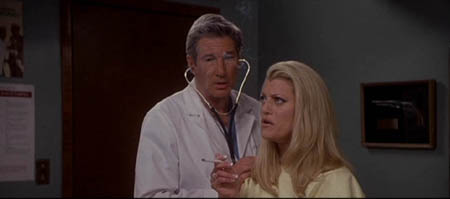
"Yep. Sounds like cancer."
And unfortunately, Dr. T & the Women is a screw up, but it is an interesting screw up. Let me make a broad comparison for a second. You know how Superbad has dick on the brain? Besides the obvious character motivations (young male teens) and plot motivations (trying to get laid) one of the main characters confesses to formerly having a condition in which he draws more naked dick than Frank Miller. The film even ends with its title plastered on a dick drawing of Mr. T. Not exactly subtle, but funny.
Now, from Mr. T to Dr. T, what’s similar? Altman’s film has vag on the brain. This time, the title is pleasantly branded over an elderly woman’s spread legs as she nervously let’s the good doctor (Gere) dust the cobwebs out of her trusty, old iron box. Later, a golf and hunting buddy of Dr. T (which is a pretty dandy phallic symbol, come to think of it—it’s not like the guys name needs to be shortened or anything; it’s Travis not Takalookalips) gets stuck in a rainstorm and talks about how he likes women wet (as opposed to dry and sandy?!?). And there is moisture everywhere in this movie, all if it symbolizing femininity and rebirth, two of the films major themes.
For instance, early on, Mrs. T (Fawcett) has a mental breakdown in a mall and removes all of her clothing and prances childlike in a fountain. Get it? From that point on, she’s stuck in a childlike state and refuses to have sex with T and eventually she’s committed to a mental institution. Her condition is explained in an end-of-Psycho way by a handy movie psychologist who tells Dr. T that his wife is suffering from a rare condition that commonly occurs in women who have everything they possibly need (money, stability, sex, etc). The childlike state allows them to want something again, and reject anything they already have.
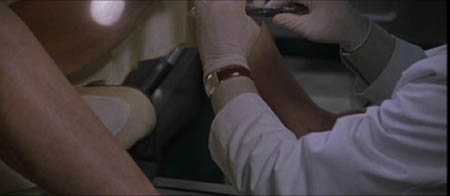
Along like her kids teeth, Britney gets her vagina whitened every couple of months.
Meanwhile, one of Doc T’s daughters (Kate Hudson) is getting married to a guy we literally see on camera once and his other daughter (Tara Reid) suspects that the bride to be is really a lesbian with the hots for her maid of honor (Liv Tyler). The Doc’s office is like a hen house (beautifully underlined in the credit sequence, which is another masterful Altman single-shot opening) meaning virtually every women in Dallas either wants the touch of T in their tender bits or has been spending too much time bar hoping with Tara Reid. As Dr. T’s life spins out of control, so does his office, and the more time he spends with his personal problems the more his patients get their panties in a bunch (hey, maybe that’s their problem down there!).
And added to the mix is a new romance for the doctor in the boring form of Helen Hunt, a golf pro setting up shop at the local green to give lessons and get some T-lovin’. Something about Hunt’s character (Bree, sounds like the cheese, but is just a C and an H away from Breech. Get it?) appeals to Dr. T, and it’s not until the end, when all of his women problems escalate to a point of near anarchy that he realizes what it is. Bree is a free-spirited, independent woman who doesn’t let rules of feminine society dictate her thinking or state of mind. This is illustrated by her profession (she’s the only female character in any of the golf scenes) and her behavior (she’s the only female character who doesn’t strut around in overly-designed costumes clucking like a chicken on crack). The question is, is the good doctor similarly independent, or has he been locked into the confines of masculine society without even realizing it? And, more importantly, how is he going to get away from all these crazy bitches?
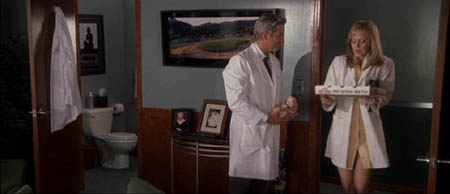
Shelley Long Pizza. Delivery in twenty minutes or your fetus is free.
The Lowdown
Ultimately, while both of those questions may be answered, neither answer is very satisfying. The main problem with Dr. T & The Women is that it wants to make us think and it wants to be a cute romantic comedy, too. However, beyond the central gag of the movie (that Richard Gere is the local gynecologist and that his office is pretty damn busy. See, because…women find Richard Gere attractive), there isn’t really much entertaining going on. We get plenty of symbolism, though! Just count how many birds (classic feminine symbol) bodies of water or fountains show up in any given shot. Hell, every time Dr. T interacts with Helen Hunt she’s either wet (from the rainstorm, or from a fountain at the golf course) or gets her aqua on mid-scene (she jumps into the shower during of their first big date, only later to lead Gere upstairs to make love with her figure silhouetted against the glass shower wall). Naturally, the chaotic ending at
Heady stuff. But I don’t think I laughed once during the whole film and I barely ever smiled. Gere (who isn’t my favorite actor, but has been on a role this year with The Hoax and the upcoming The Hunting Party and I’m Not There) isn’t even particularly charming and doesn’t even seem to connect with the character until the very end. While that might be intentional, it doesn’t exactly work for the audience. Hunt, meanwhile, remains a boring blonde slab of bland, and her chemistry with Gere is non-existent.
Even Altman’s point is a little bit one-dimensional. While I loved some of the early scenes featuring Fawcett going buggy in the middle of Tiffany’s, reacting to the societal impulse to be provided for by a masculine world (and capitalism, as illustrated by a few of Altman’s infamous slow plans, in this case going from Fawcett’s naked bod in the fountain to large signs for GODIVA chocolates and GUESS? clothing) we’re left with few healthy female characters to latch onto. When Bree hears from T that his daughter might be a lesbian, she simply tells him that in order for her to be happy, her daughter has to listen to her heart. And that’s the gist of it. While the film sometimes gets condemned for borderline misogyny, Altman wisely lines up both male and female gender roles for scrutiny. But his answer to breaking free from the confines of those gender roles is simply to listen to your heart? Or maybe the movie is a giant joke and the point is that Richard Gere has to stop being a giant pussy (get it?) and live the way he actually feels he should. Whatever the case, Dr. T and the Women fails to connect with us like other Altman films, although I have to admit that hours after watching it, I’m still thinking about the ending and what it means. As the man once said, there is great value in failure indeed.
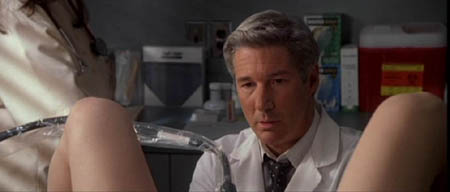
I was going to make a gerbil joke here. But, no.
The Package
Most of the features in this special edition revolve around the recently departed Altman’s career and have very little to do with the film, which is fine by me. There’s a featurette with writers and actors discussing their collaborations with Altman and his infamous free-wheeling style of shooting movies. Neat tidbits can be found here, including the fact that Elliot Gould improved the last line of California Split and Altman loved it so much that the entire ending of the movie was altered to fit his in-character moment. There’s another that focuses on Altman’s pre-Hollywood days of directing shorts and instructional videos for companies and corporate clients (you know, the kind of thing that you can find in the Something Weird section of Comcast’s On Demand. I recommend the one from the 50’s about butter). Elsewhere, there’s a bland interview with Altman about the film (he surprisingly defends it and says that twenty years from now people might see it as one of his best), a standard making-of doc and an ineffective, cut-and-paste commentary with cast members, writer Anne Rapp (who wrote the much superior Altman-directed Cookie’s Fortune) and Altman himself. The SE cover art one-ups the original release (and poster) by ditching the female silhouettes and trapping the “oh, why me?” Richard Gere around giant floating female-head prison. One point of interest: in the making of feature, Tara Reid admits that she agreed to appear in the movie for free gynecologist consultations.
No, no, kidding, kidding. Oh, how I wish that were true…
5.7 out of 10